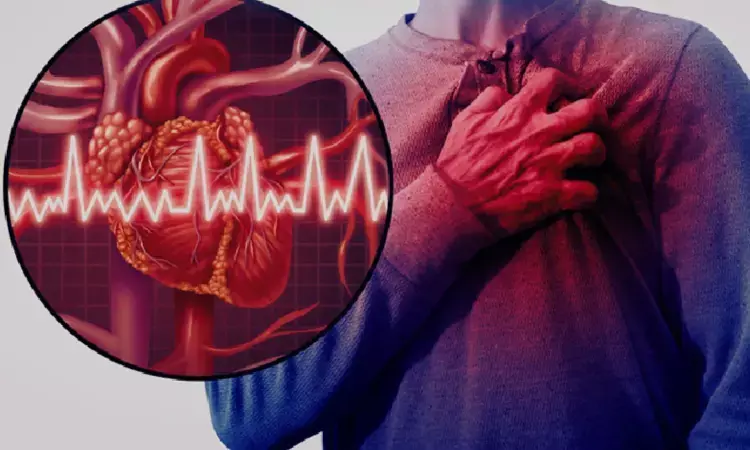- Home
- Medical news & Guidelines
- Anesthesiology
- Cardiology and CTVS
- Critical Care
- Dentistry
- Dermatology
- Diabetes and Endocrinology
- ENT
- Gastroenterology
- Medicine
- Nephrology
- Neurology
- Obstretics-Gynaecology
- Oncology
- Ophthalmology
- Orthopaedics
- Pediatrics-Neonatology
- Psychiatry
- Pulmonology
- Radiology
- Surgery
- Urology
- Laboratory Medicine
- Diet
- Nursing
- Paramedical
- Physiotherapy
- Health news
- Fact Check
- Bone Health Fact Check
- Brain Health Fact Check
- Cancer Related Fact Check
- Child Care Fact Check
- Dental and oral health fact check
- Diabetes and metabolic health fact check
- Diet and Nutrition Fact Check
- Eye and ENT Care Fact Check
- Fitness fact check
- Gut health fact check
- Heart health fact check
- Kidney health fact check
- Medical education fact check
- Men's health fact check
- Respiratory fact check
- Skin and hair care fact check
- Vaccine and Immunization fact check
- Women's health fact check
- AYUSH
- State News
- Andaman and Nicobar Islands
- Andhra Pradesh
- Arunachal Pradesh
- Assam
- Bihar
- Chandigarh
- Chattisgarh
- Dadra and Nagar Haveli
- Daman and Diu
- Delhi
- Goa
- Gujarat
- Haryana
- Himachal Pradesh
- Jammu & Kashmir
- Jharkhand
- Karnataka
- Kerala
- Ladakh
- Lakshadweep
- Madhya Pradesh
- Maharashtra
- Manipur
- Meghalaya
- Mizoram
- Nagaland
- Odisha
- Puducherry
- Punjab
- Rajasthan
- Sikkim
- Tamil Nadu
- Telangana
- Tripura
- Uttar Pradesh
- Uttrakhand
- West Bengal
- Medical Education
- Industry
Spironolactone Fails to Lower Heart Failure and Cardiovascular Deaths in Acute MI Patients: CLEAR SYNERGY trial

USA: Spironolactone administered to patients after percutaneous coronary intervention (PCI) for acute myocardial infarction does not reduce cardiovascular mortality or the incidence of various cardiovascular events, including new or worsening heart failure, findings from the CLEAR SYNERGY trial have shown.
The CLEAR SYNERGY trial has dealt a second setback to the 2x2 factorial design study. Following the disappointing results from the colchicine arm last month—where the anti-inflammatory agent failed to reduce major cardiovascular (CV) events after acute myocardial infarction (MI)—new findings from the spironolactone arm show a similar lack of impact.
Dr. Sanjit Jolly from Hamilton Health Sciences/Population Health Research Institute, Canada, presented the latest data at the American Heart Association (AHA) 2024 Scientific Sessions. These results were simultaneously published in the New England Journal of Medicine alongside the full colchicine trial results.
Despite hopes that a mineralocorticoid receptor antagonist (MRA) like spironolactone might show benefits where colchicine did not, the trial results were disappointing. Dr. Jolly referenced previous studies like EPHESUS, which demonstrated that eplerenone, another MRA, reduced all-cause mortality in patients with heart failure (HF) following MI. However, two other conflicting trials, REMINDER and ALBATROSS, left the potential benefits of early MRA use in modern settings unclear.
In the current study, 7,062 patients from 14 countries were randomized to receive either spironolactone or a placebo immediately after PCI for STEMI or large NSTEMI. Less than 1% had prior heart failure, as noted by Dr. Jolly. While there was a numerically lower incidence of cardiovascular deaths and new or worsening HF in the spironolactone group over three years (183 vs. 220 events), the difference was not statistically significant. Similarly, there were no significant differences in the first occurrence of MI, stroke, new or worsening heart failure, or cardiovascular death (280 versus 294 events; HR 0.95).
Discontinuation of treatment was a notable issue in the trial, mirroring what was observed in the colchicine arm, with 26% of patients stopping their medication. Serious adverse events occurred in around 7% of patients in both the spironolactone and placebo groups. In the spironolactone group, 1.1% of patients discontinued treatment due to hyperkalemia, while 2.3% developed gynecomastia.
Given the high rate of discontinuations, the investigators performed an on-treatment analysis, which revealed what Dr. Jolly described as an "exploratory and hypothesis-generating" signal. In the analysis, patients treated with spironolactone showed better outcomes than the placebo group, particularly due to a reduction in new or worsening heart failure.
"In patients with myocardial infarction, spironolactone did not lower the rates of cardiovascular death, new or worsening heart failure, or the combined incidence of cardiovascular death, myocardial infarction, stroke, or new or worsening heart failure," the researchers concluded.
Reference:
DOI: 10.1056/NEJMoa2405923
Dr Kamal Kant Kohli-MBBS, DTCD- a chest specialist with more than 30 years of practice and a flair for writing clinical articles, Dr Kamal Kant Kohli joined Medical Dialogues as a Chief Editor of Medical News. Besides writing articles, as an editor, he proofreads and verifies all the medical content published on Medical Dialogues including those coming from journals, studies,medical conferences,guidelines etc. Email: drkohli@medicaldialogues.in. Contact no. 011-43720751


